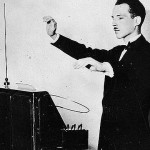(originally published by Bartleby Snopes)
a short story by James David Patrick

When the snow melted in February, a teeter-totter appeared where there had previously been nothing but a pile of vines, pried from the rosebushes and left there through the change of seasons. I’d willed it to appear, having closed my eyes so tight my stomach clenched up like when Peter Dumbrowski threatened to punch me in the nose during recess. I asked my mom how this could have happened. She said she didn’t really know and that I should ask my dad. My dad, who was clearly much smarter than my mom because he had an answer for everything, said it was because things have a way of showing up when you need them the most. I disagreed because last Sunday I really needed the Vikings to beat the Packers and they just embarrassed themselves. My sister and I went up, we went down, but after the immediate thrill the teeter-totter lost its appeal. Not because the teeter (or is it the totter?) wasn’t inherently fun, but because this was during Alexis’s “heavy” phase. I was up far more often than I was down. We forgot that initial joy of discovery. Weeds grew tall around its sturdy base without our feet (especially Alexis’s) to trample them. Then one day in August the Totter was just gone. Perhaps I’d willed it away by forgetting about it, just as I’d willed it into existence. I asked my mom what had happened to the teeter-totter, and she said she couldn’t really say. I asked if Alexis ate the teeter-totter having mistaken it for a tater tot in a fit of summer lunchroom-tot-withdrawal. Dad laughed as he read the paper. Mom told me the conversation had ended.
I started to fear that the teeter-totter had never happened at all; after the disappearance no one spoke of it. I couldn’t know for sure until I needed something the most again. Months passed. I’d wanted a lot. A new baseball glove and a trampoline, for example, but I couldn’t say I’d needed them the most. I rode the pine on my Little League team and the trampoline was only a necessity because I wanted to impress a girl named Cathy who ignored me. A trampoline would change that.
By next winter, Alexis had lost the weight. She kept on losing weight until she felt sick, all the time. And she turned orange from using so much fake tanner. I told her that she needed a burger and to cut it out with the tanner, but she insisted otherwise. She said I’d understand when I grew up. She was only six years older than me so I couldn’t have needed all that much growing up. With dad away on business again, I felt I needed to take matters into my own hands. When I went to bed that night I closed my eyes and wanted so badly for her to eat, not to want a juicy burger for dinner tomorrow. One of those half-pound Canadian Angus burgers we got when we drove to Winnipeg on holiday with the melted cheese and grilled onions and sometimes the mayonnaise, but I didn’t want to push it because mayo spoils if it’s left out too long. I knew nobody could resist one of those burgers. The next day, mom called me down the stairs, I thought to dinner, but the table was bare. I heard Alexis puking in the bathroom. Mom stood outside the door, pointing to the table. She asked if I’d done that. I noted the half-pound burger on the table, minus one bite, and then nodded. A smile crept across my face. Mom sent me back to my room and told me to take the burger with me. She’d been crying. Of course I took the burger; you couldn’t resist the Winnipeg burger. Dad took half before I could make it up the stairs. One bite. I didn’t even know he’d come home. He must have come when he heard about the burger. I checked for mayo. No danger of spoilage.
I visited Alexis in the hospital. Mom said she’d been feeling better and wanted to see me. She asked about school. She asked if that Peter kid was still picking on me at recess and if I’d talked to Cathy yet. Last week I’d willed Peter into another school district and the next day Miss Stapleton said he’d moved to North Dakota. If anyone deserved a Dakota it was that prick. Not so much progress with Cathy. Alexis asked if I was taking care of mom. I didn’t understand how I’d be the one taking care of mom so I just said yes, of course. Alexis didn’t really sound like herself but before she came here you’d have needed a Geiger counter to get a good reading on her moods.
A nurse appeared and replaced the tube in Alexis’s arm with another one. After the nurse left I pulled Alexis’s bottle of fake tanning lotion from my pocket, placed it in the bedside drawer next to a bible and closed the drawer. Contrabrand. Without her lotion she’d gotten so pale, if less orange. Apropos of nothing I said that dad had been working a lot and hadn’t been home much. She asked where I’d learned the term “apropos.” I shrugged. Then she got angry. She said dad’s gone. Then she repeated it. I reminded her that dad came to visit her in the hospital the same day that he took me to the zoo. That’s different, she said. I didn’t see how. I explained that I’d closed my eyes and wished to see the penguins. The next day dad took me to see the penguins. She sat forward in bed and said, he left and he’s not coming back. Not like you need. You don’t understand anything, she said. A nurse suggested I should meet my mom in the waiting room. I agreed.
I’d begun to notice that nobody talked about dad always being on business anymore. No more talk about trips to Madison or Calgary or Eugene, which I’d just realized was a place and not our Uncle Gene in Michigan that bred Brittany spaniels. When Alexis came home from the hospital she wasn’t allowed to shut her door. I took this opportunity to bother her more than usual, asking to borrow this or that, usually CDs or sparkly writing utensils. She said yes to everything I asked, which took most of the fun out of it. She just kept saying yes, except the time she grabbed my hand and said “I didn’t think I would but I really miss dad.” If it meant getting my old sister back, the one that would bounce me out of the room, throw her magic 8-ball at me to keep me from reading her diary, I needed to try something. Later that night, I thought and thought about how I needed to will my dad back home. The next morning a man named Will appeared in the kitchen and asked me to call him dad. He made blueberry waffles and served them to each of us on the nice plates, the ones we weren’t allowed to use. He kissed my mom on the cheek. I guess something got scrambled in the communications.
October brought our first snowfall of the year. Late November blanketed the North Country. This meant tunnel season had begun. Alexis didn’t join me as she always had. She still kept her door open, except at night, when it was only open a crack. She rarely came out. I spent more time with the Feuchtwanger twins across the street, but their mom wouldn’t let them tunnel because they’d probably catch a bug. The way she accused them of bringing these things into their home you’d expect them to catch raccoons rather than pneumonia. I grew bored with the Feuchtwangers and the empty tunnels. I grew bored with Will. He’d moved in permanently and made us blueberry waffles every Sunday. Mom was happier. She kept telling us that since she was finally happy we should be happy too. I wasn’t so sure since I’d just started doing the reflexive property in math class and that just didn’t fit, but then again, Miss Emerson kept telling us that this was advanced math and we shouldn’t get too upset if we didn’t get it yet. We still saw dad once in a while, but he wasn’t himself. He’d stopped shaving and he moved out to Little Falls where he said rent was “more economical.” I begged him to come home because things just weren’t the same. Alexis never said anything when we saw him so I did the talking for both of us. I told him that we needed him at home the most we’d ever needed him. Will was fine, but he needed to learn how to make something else besides blueberry waffles. I asked dad if he remembered when he said that things have a way of appearing when you need them the most. He nodded. He said he might have been mistaken.
Alexis never left her room except to go to school or the bathroom. She’d put on weight again, but she wasn’t nearly as heavy as she had been last spring. Mom seemed to think everything was okay. I wasn’t okay. It was winter in Minnesota and without fellow tunnelers and snow fort constructors, there really wasn’t anything left to do except sit inside and play Nintendo but I was limited to only thirty minutes a day. Mom said it was bad for my eyes and Will did nothing to disagree with her. Dad would have bought me some more time because he knew more about that kind of stuff than mom. I’d gotten sent to my room for breaking a vase with a Nerf ball after I’d been told repeatedly not to play with the ball inside. I argued that no one had bothered to offer a reasonable alternative to not playing with the Nerf. Will called me a smartass. I could come out, my mom said, when she wasn’t mad at me anymore. That seemed arbitrary. I pulled the covers up over my head to block out the last of the daylight and closed my eyes. I closed my eyes so tight that I made my stomach ache and my eyes sore. It worked once so it would work again. I begged and begged no one in particular. I said “I will the teeter-totter into the backyard.” I said it over and over until I got so hot I had to pull the blankets down to breathe. Maybe, if the teeter-totter came back Alexis would come outside again and dad would come home. Maybe then everything could go back to normal.
Every so often I’d stick the shovel into the snow where the teeter-totter had been, just to see if I struck anything hard beneath the snow. I never did. But then again the snow was dense and there was a lot of it. Mom said we’d reached our seasonal average by the end of January. I couldn’t remember anymore if I wanted more snow or less. One morning I made the mistake of suggesting that I missed the teeter-totter. It just fell out. Will served me a waffle and said how those things were childish and kind of unsafe. He added bananas to waffles now. We had options. Mom nodded and said she was so happy to hear that he felt that way about the teeter-totter. Will kissed her on the cheek. Alexis pointed down her throat. I had to laugh. I wonder if Will also thought pancakes were dangerous and that’s why we never had any.
When the temperature reached the mid-thirties in late February I began watching out my window into the backyard. Sun reflected off the snow, melting the top layer each day so that it could freeze again at night. A layer of epoxy, like the finish dad put on Alexis’s craft table that now lay beneath a mountain of magazines, including the occasional Vogue that she’d smuggled in. We weren’t allowed to read those adult magazines because mom said we weren’t old enough to digest them. Alexis came in my room and sat down on my bed. She seemed so out of place.
The jagged icicles that had once blocked my backyard view had shrunk down to rounded nubs. Water dripped onto the windowsill in unpredictable patterns. Just when I thought I had a handle on the pattern everything would change. I told Alexis to watch, that I could stick my head out the window and catch the drops in my mouth. “You know dad bought you that teeter-totter,” she said. I shook my head. I said I willed it there because I wanted it so badly it hurt. I told her to wait. Wait and see because last year I didn’t want it nearly as much as I wanted it now. She said nothing. I made her promise that if it appeared she’d come outside and play with me, just as soon as the snow melted. I watched through the window. I waited and wanted. She said, “Sure,” and walked back into her room. I could tell she didn’t mean it. She didn’t believe. But I knew better. I knew that one morning, when the snow gave up its hold, the teeter-totter would appear, just as I said it would. I’d wake Alexis to tell her. She’d actually beat me down the stairs, through the kitchen and out the back door saying “No way, no way, no fucking way.” Mom and Will wouldn’t have made it downstairs yet because if they had they certainly would have told us not to go outside, there wasn’t enough time, you’ll just get your clothes muddy. Alexis and I would sit on opposite ends of the teeter-totter and I’d start on the high end, as I always did, waiting for Alexis to push up off the ground. In another moment I’d fall back down to earth and watch Alexis rise into the air, her waxen frown taken over by a smile. And even there, cemented in my dream, her smile looked so unnatural, so out of place, like I’d willed it there out of thin air.
BIO: James David Patrick has an MFA from the Stonecoast program at the University of Southern Maine and lives in Pittsburgh where he can often be found sifting through stacks of vinyl at Attic Records or begging his daughter for new story inspiration. He has previously published with Monkeybicycle, PANK and Spectre Literary Magazine; tweets at @30hertzrumble and blogs at www.thirtyhertzrumble.com.













